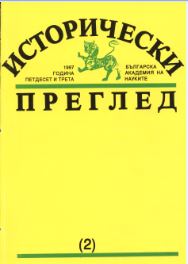Мелник между „българина-орач“ и „средиземномореца-лозар“ (за трайността на една етнокултурна характеристика)
Melnik between the “Bulgarian Ploughman” and the Mediterranean “Vinegrower” (About the Durability of An Ethnocultural Characteristic)
Author(s): Galya Vulchinova, Radoslava GanevaSubject(s): History, Cultural history, Ethnohistory, Modern Age
Published by: Институт за исторически изследвания - Българска академия на науките
Summary/Abstract: In both Bulgarian and Greek historiography Melnik is given as a classical example of a “centre of Graecism” in the Bulgarian lands. Small but dynamically developing up to the end of the 19th c., a town the economic power of which rested chiefly in viticulture and the wine trade, it is accepted as a standard of the economic activity and cultural vitality of the Greek element despite its small size and isolation amidst the “Slav” (Bulgarian) sea. This motif was played in the Western literature of the 1920s and 1930s in several directions, including the contrast between the highly civilized Greek vine-grower and the uncultivated Bulgarian ploughman. In this way was built up an ethnically coloured model of the quality of being “civilized”. We find one of its latest reincarnations in the definition of the “small Balkan town”, given recently by G. Prevelakis. The authors of this article suggest that the mechanisms of the hellenization of the Bulgarian population should be sought within the framework of the marital strategies, centred on the possession and transfer of the house as real estate by the wife, respectively the daughter, and the adoption of the luxurial-local principle of settling down. The application of this mechanism, radically different from the Bulgarian traditional model, is discovered in numerous areas of the Greek ethnocultural massif. In the concrete case it helped in drawing and keeping the manpower needed in the socio-economic conditions specific for this area: development of prestigious wine-making and wine-trade. The suggested interpretation of the “Graecomania” is a step towards overcoming a cultural and political cliche, focused on old complexes and opening this set of problems for painless research analysis.
Journal: Исторически преглед
- Issue Year: 1997
- Issue No: 2
- Page Range: 142-159
- Page Count: 18
- Language: Bulgarian
- Content File-PDF

